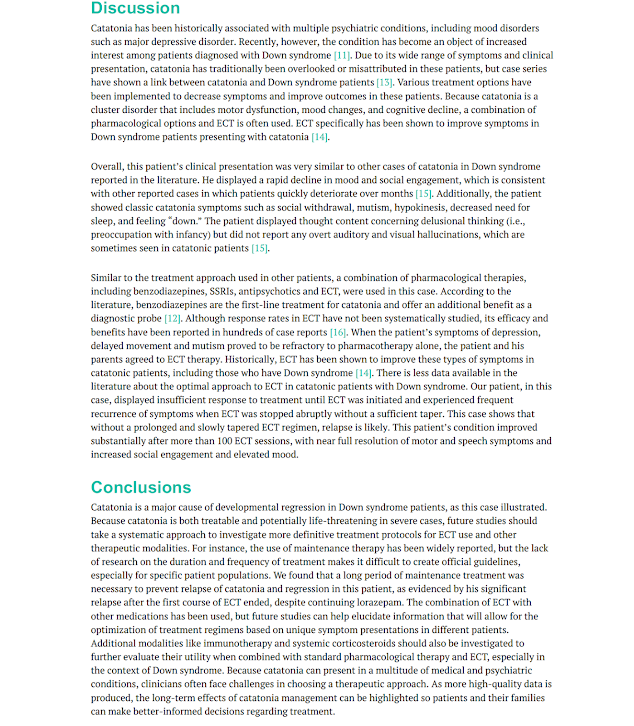Acute and MECT for Depression and Catatonia in a Patient With Down Syndrome: Case Report in Cureus
Out on PubMed, from clinicians in Florida, is this case report:
Maintenance Electroconvulsive Therapy, Developmental Regression, Depression and Catatonia in an Adolescent With Down Syndrome: A Case Report.
Cureus. 2022 Nov 26;14(11):e31905. doi: 10.7759/cureus.31905. eCollection 2022 Nov.PMID: 36579295
The abstract is copied below:
This is a case report involving a 22-year-old male with a past medical history of Down syndrome and major depressive disorder who, at age 16, became preoccupied with returning to an infant-like state. He experienced a gradual deterioration in his mood over a year and began to show symptoms consistent with catatonia. These symptoms included waxy flexibility, hypokinesis, decreased appetite, mutism, and altered sleep habits. Pharmacologic therapy was initiated, and the patient experienced a waxing and waning pattern of improvement and regression. Over several years, various combinations of antidepressants, benzodiazepines, and second-generation antipsychotics were attempted. The patient and his family discontinued all medications except his benzodiazepine in early 2019 and decided to try electroconvulsive therapy (ECT). After more than 100 sessions of ECT between 2019 and 2022, the patient showed notable improvement in overall mood, and his appetite and sleep completely returned to baseline. His speech, affect, and movement also improved. With ECT, the patient showed the most sustained and substantial improvement in his catatonic symptoms. ECT has been historically shown to improve these types of symptoms in catatonic patients, including those who have Down syndrome. Often, clinicians do not consider the possibility of catatonia in patients with this type of presentation, which is unfortunate as misdiagnosis leads to increased morbidity. Additionally, there has not been much discussion of the optimal length of treatment and the necessity of slowly tapered maintenance therapy in the literature. This case report illustrates how catatonia can be a major cause of developmental regression in patients with Down syndrome and offers an example of a promising management strategy for the treatment of this condition.
Keywords: developmental regression; down's syndrome; electroconvulsive therapy (ect); major depression disorder; treatment-resistant catatonia.
The pdf is here.
And from the text:
Here is another case report demonstrating safe and effective ECT in a patient with Down syndrome, depression and catatonia.
It highlights the need for maintenance ECT.
The report is pretty good, but not without its shortcomings: there are no ECT details, the timeline of response to ECT is unclear, there is conflation of depression and catatonia symptoms (feeling "down" is not a "classic catatonia symptom") and the mechanism of action of ECT is said to be that it "increases cortical blood flow to stimulate GABA activity in the brain." (maybe true, but just one piece of the pie...)
Still and all, kudos to these authors for adding to the literature on catatonia in Down syndrome; catatonia mavens will want to read this report in full, ~10 minutes.





Comments
Post a Comment